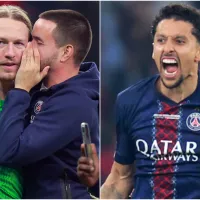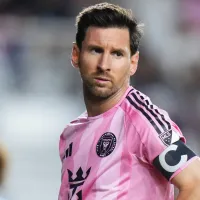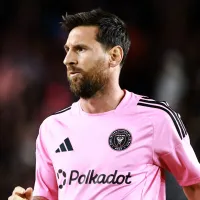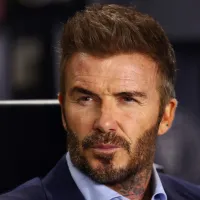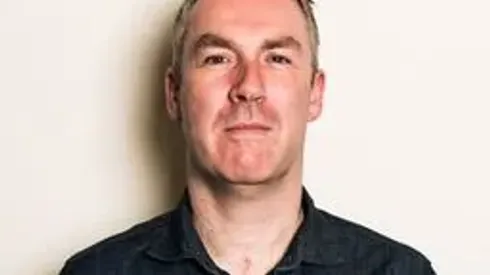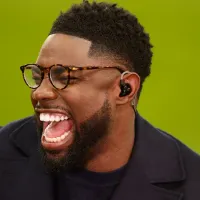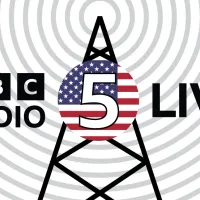Where it regards what BBC Radio 5 Live overnight presenter Dotun Adebayo has termed ‘Brazilian shirt names,’ Andy Brassell has gone by many in his professional career. ‘Top Brass.’ ‘The Lion of Lyon.’ ‘(Getting Down To) Brass Tacks.’ Even once, on a night when he was on 5 Live’s World Football Phone-In via ISDN from Newcastle, the ‘Frog on the Tyne,’ a play-on-words of Lindisfame’s second album.
All joking aside, though, the London-born Brassell, 32, has also amassed a strong portfolio as a freelance sportswriter, contributing to UEFA’s ‘Champions’ magazine as well as ‘When Saturday Comes’, Sky Sports’ website, ‘The First Post’ and portugoal.net. In 2006, he also made his authorial debut, releasing All or Nothing: A Season in the Life of the Champions League. On top of that, he and Tim Vickery have in recent months taken their show on the road, so to speak, signing on as the European and South American correspondents respectively for the World Soccer Daily radio program out of Los Angeles.
EPL Talk readers may recall Vickery’s interview with Christopher Harris for Episode 105 of our podcast, but with Brassell joining Tim on WSD in recent months, and also this week’s return of the UEFA Champions League, we thought it was high time we also formally introduce the ‘Brassanova’ to his newfound North American public.
See what I’ve done there? No? Good, let’s pretend that bit never happened. Now, though, let’s get onto something that actually did – The interview:
With London being the most linguistically diverse city in the world, did growing up in such a multicultural setting contribute at all to your interest in football in mainland Europe?
Brassell: I guess that would make sense – the idea of diversity never really struck me as a concept until later in my childhood, as it was just the norm. But really, European football just seemed so exotic to me when I was a child (and it still does!). We never really had the money to go off on overseas holidays, so teams from France, Germany, Italy, Poland or wherever just seemed as if they were from different planets to me. When I saw a non-English team on the TV, I used to dig out the atlas and find out where they played. The ban on English clubs in Europe when I was growing up just accentuated this feeling. Frankly, I would have given my right arm to have Spanish football on TV when I was a kid, and when Gazza moved to Italy and they started showing Serie A – when I was a teenager – it was fantastic. Today’s young folk don’t know how lucky they are!
You support AFC Wimbledon now, but followed Wimbledon F.C. before the club moved to Milton Keynes. Describe the mood around Selhurst Park in those final months, and have you ever felt any bitterness about what happened to the club?
Brassell: Well, I don’t exactly wish MK Dons well, that’s for sure. And of course I felt a great sense of loss when the move became concrete with the FA appeal decision, shamelessly buried in the midst of England’s 2002 World Cup campaign by the spineless people who allowed the decision to pass contrary to their own laws.
The final game we all went to as Wimbledon as was (v Barnsley at Selhurst Park) was surreal – protests went on throughout the game and some even cheered Barnsley’s winning goal, though a minority of others, unbelievably, were still moaning at people to just ‘sit down and watch the game,’ conveniently overlooking the fact that if we left the club to get on with it, there wouldn’t be a game to watch anymore. Fortunately the vast majority of the hardcore didn’t bury their heads in the sand, but fought the good fight from beginning to end in a peaceful and dignified, yet passionate way.
The positivity that the supporters created by mobilising in the face of such a bleak situation is what created AFC Wimbledon, so while I wouldn’t want any set of fans to go through what we Wimbledon fans went through in 2001-2, the protests that went on in that season were inspiring, and it’s actually hard to regret what’s happened since. Today we have a club that we can be immensely proud of. So much so that while MK Dons are a despicable creation, I don’t really share the revenge fantasies against them that others (quite understandably) do. They’re just not that important.
Are there any other clubs that you’ve encountered in your travels that you’ve taken a liking to and/or kept a lookout for their results?
Brassell: I feel a closeness to Lyon as I watched them every other week for a couple of years, but believe me, there will be no split loyalties when AFC Wimbledon play them in the 2021 Champions League final!
What made you choose to move to Lyon – and, later on, back to London – and what differences did you discover between living in England and in France?
Brassell: My wife and I had both talked about leaving London to try something else for a while – she studied in Spain and France and went back to Spain to live for a while after her studies, so missed living abroad a little. We already had friends who were from Lyon, so it was a good way to introduce ourselves to life in France. It’s also very close to Switzerland, which was handy in the lead-up to Euro 2008.
Coming from London, the pace of life was different of course. It was definitely a case of leaving my ‘London head’ at home as you have to be more patient. I actually chose which bank to go with on the basis that it was the only one that didn’t shut for a lunch hour! On a football level, the atmosphere in stadiums was much better than British people might expect, though France has singularly failed to embrace Britain’s number one sport, ie watching football in the pub. Nowhere near the same numbers go to watch games there and if they do, it tends to be specifically for that purpose, and when the game is over, people leave straight away. Though this is very handy if you want to take your other half out for a drink and watch the game at the same time, which would never happen here in the UK!
The bio at the beginning of your book lists you as having been living in Battersea, London, but you dedicated the biggest number of chapters in your book to Ligue 1 sides (Marseille, Lyon, Monaco and Saint Etienne), and covered as many Spanish clubs (3) for the book as you had English teams. What do you feel that the leagues in France and Spain offer that others don’t?
Brassell: The pick of clubs covered in the book was quite arbitary, as it was a project that evolved very organically. Whilst freelancing, I had the opportunity to go to Champions League games over Europe, so the idea of a running narrative of the CL season occurred to me, and I had to make the decision to go with it there and then. As I was doing a bit of work in France, I have quite a few French clubs in the first half of the book, though I wouldn’t have included them were they not relevant to the project as a whole and for this reason I left a few others out. Factoring in clubs from diverse countries in Europe was necessary as the book progressed to give it balance and shape.
That said, I do love French and Spanish football. Ligue 1 fascinates me because France has produced, and still produces, such fantastic players, and this is where they all start – think of the likes of Thuram, Petit and Henry coming from Monaco, and how excited the French media are at the moment that their ‘new Zidane’, Yoann Gourcuff, is following in Zizou’s footsteps at Bordeaux. It has evolved now into almost a finishing school for Premier League players, and you can see why. The technical level that players glean from their formation is supplemented by a really tough, physical league. The physical aspect isn’t always something that the French themselves appreciate – note Platini’s comments that ‘if I wanted to see athletes, I’d watch the Olympics’ – but it is the single biggest barrier to overseas players succeeding in English football, and players who’ve played in Ligue 1 first are better prepared than most.
Spain is still the best for me, I have to admit. I can understand why the Premier League tends to be the preferred choice of the world – the intensity, etc. – but there is a better balance in Spain between technical excellence and excitement, in my view. The overtly political side of it is fascinating, too, especially for an outsider.
Considering all the legwork that you’d done for the book, it wouldn’t have made sense for you to not be in attendance for that season’s final in Gelsenkirchen. What was the atmosphere like in and around the ground? Was there ever a feeling that throwing Chelsea and/or Deportivo La Coruña (that season’s semifinal losers) into the mix would have made for a more interesting final?
Brassell: The atmosphere was good, and I should know, as I got there four hours before kick-off! But it was more convivial and fun than passionate, mainly for two reasons. Firstly, one of the clubs, Monaco, have next to no fans and their allocation was therefore filled with a lot of ‘tourists’ as opposed to regulars. It was a pretty normal French sporting crowd, there for the spectacle rather than to roar their side on with passion and blind faith. Secondly. while the Arena AufSchalke is a very tidy stadium indeed, it’s completely isolated. It’s 20 minutes’ tram ride out of the centre of Gelsenkirchen (which is hardly Vegas anyway) and so there is the stadium, the training pitches, club museum and nothing else there. There was a fan park but of course this lacks the spontaneity of a normal working city welcoming a load of football fans for the day. I understand that a fan park is more practical, but it’s not the same.
Football-wise, I think the final was just right. It really was the year of the underdog in the competition. Monaco played the most exciting football, and Porto the most effective, so they both deserved to be there, and the better team won. Deportivo are a good microcosm of that season as a whole, going through all the highs and lows of cup football in the Champions League and agonisingly missing out on what was their best-ever chance.
I cannot imagine that irony is ever lost on authors when they are choosing what to put on their book covers. What was the reasoning behind choosing the cover photo that you had for All or Nothing – do you see it as equal parts Jose Mourinho kissing the trophy as well as his reflection?
Brassell: That he was kissing his reflection wasn’t actually something I noticed until after I’d chosen the photo and a friend pointed it out, but it’s no less amusing for that! I just felt Mourinho was the key figure in the competition that year. Porto weren’t a team of stars, but completely moulded in the image of their coach. As I said in the book, if you spoke to Porto fans about the team’s success, they immediately referred to the coach ahead of any of the players, which is quite unusual.
At the end of the book, you make an interesting point about big clubs bringing in big-name players over the summer months to help make up for any shortcomings in the season just gone. Do you think we will continue to see much of that in the coming years, especially given the stark changes to the economic climate even just since the book was published?
Brassell: I think so. Referencing the book, Leeds are a good example of what can happen when a club are trying to punch above their weight, as are Depor, who ran on a huge debt to finance their years of success and have been paying for it ever since, so I don’t think the global climate of the moment is the only reason clubs would get themselves in a hole. It will always happen. On the other hand, Bayern will always be Bayern – if they’re coming up short, they will go and buy the players they need. Last time they missed out on the CL, they went and bought Ribery, Toni, Klose, etc. And the real giants of the game will always get a degree of credit if they need it.
In recent months, both you and Tim Vickery have signed on as correspondents for World Soccer Daily out of Los Angeles, serving in similar capacities to your work with the World Football Phone-In on BBC Radio 5 Live. Does it feel strange to field questions about European football from a North American audience?
Brassell: Not at all. Unlike a lot of other popular sports (American Football, basketball, cricket. etc), football is a truly global game, and with more players playing abroad than ever before, people will always be interested in following the game outside their own shores, and particularly in Europe, with the concentration of the biggest clubs in the world being there. With particular reference to the US, they have a national team that’s done well in World Cups and regardless of the merits or otherwise of MLS, American players make important contributions weekly all over Europe. It’s nearly 20 years since John Harkes came over to Sheffield Wednesday and started doing away with those stereotypes, so we really should be over it by now.
As for questions from North American listeners, here’s another: Do you feel that many clubs are buying up young American talent before those players are ready to make the jump?
Brassell: It’s not just young American talent. This is an issue for a lot of countries, particularly South American ones, where the clubs rely on transfer cash to stay afloat. Conversely, for players to learn the ropes in the league where they’re going to play – be it in England, Spain, wherever – at a young age can make them develop more quickly in the case of someone like Fabregas, who is mature enough to deal with the lifestyle adaptation.
Looking at the US I guess Jozy Altidore is the player you might have in mind – I know Pellegrini and his staff are very impressed with him and are just biding their time with him. I certainly think Altidore will learn more alongside the likes of Pires, Senna, Cazorla, etc. than he would in MLS.
Between the WFPI, WSD and all your other work, what is the most memorable question you’ve ever been asked about European football?
Brassell: Tough to sift through them all off the top of my head but I loved the one I got on WSD the other week about Torino. Nobody ever asks about them and it’s great to reminisce over what was one of Europe’s greatest footballing dynasties, both pre and post-war before the Superga disaster. Because Juve have been so successful since, people often don’t hear about that.
I noticed that you also work as a DJ. Can you tell us a little bit about how you got into that, and also, as someone who’s also a bit of a music buff, do you feel that there are many connections between football and pop music today?
Brassell: I started DJing at university, and putting on my own club nights, and have been doing it ever since. I do try to keep football and music separate, though sometimes it’s hard to resist, especially when you hear something like the bi-lingual single that Basile Boli and Chris Waddle did together when they were both at Marseille (look it up on YouTube, you won’t regret it!). It beats seven bells out of ‘Diamond Lights‘. Andy Cole’s two singles, however…..
As footballers are often big stars in wider media nowadays rather than simply famous amongst football fans, there seems to be a misapprehension that footballers are all on the same cool level as the likes of Kanye West, when if you think about, you know that if this was the ’80s, a lot of them would be driving a Ford Capri and listening to Phil Collins on a loop. I’m looking at you, Gary Neville.
Finally, in lieu of a more general ‘random facts about you’ question, there’s something that I must know: I have found in my research that you have a pet Valencian bat named Joaquin. At what point did you decide that dogs, cats, etc. weren’t cutting it for you?
Brassell: Joaquin is stuffed, and so doesn’t require the sort of attention that a dog or cat would require – and that I wouldn’t be able to provide, as I’m often travelling. He’s an independent kind of a bat, and he understands my football commitments, being a keen follower of El Che himself.
Brassell can be heard on alternating weeks between the World Football Phone-In segment of the Up All Night program on BBC Radio 5 Live, which airs on Friday nights from 9:30 p.m. EST, and World Soccer Daily – he usually appears there every other Thursday – which airs Monday to Friday from 1-3 p.m. EST. Both shows are also available via podcast on iTunes. All or Nothing: A Season in the Life of Champions League, which is out through Trafford Publishing, can be purchased on Amazon.com and also via the book’s website, www.allornothingbook.com.

